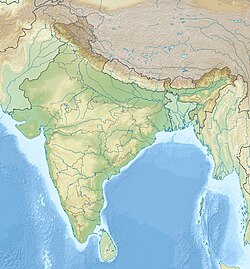
Back Sarnath BCL सारनाथ Bihari সারনাথ Bengali/Bangla Sarnath Catalan Sárnáth Czech Sarnath Welsh Sarnath German Sarnato Esperanto Sarnath Spanish Sārnāth Estonian
Sarnath | |
|---|---|
Historical Town | |
 View of Sarnath, looking from the ancient Mulagandha Kuty Vihara towards the Dhamek Stupa | |
| Coordinates: 25°22′41″N 83°01′30″E / 25.3780°N 83.0251°E | |
| Country | |
| State | Uttar Pradesh |
| District | Varanasi |
| Languages | |
| • Local | Bhojpuri |
| Time zone | UTC+5:30 |
| Pilgrimage to |
| Buddha's Holy Sites |
|---|
 |

| Part of a series on |
| Buddhism |
|---|
 |
| Translations of Sarnath | |
|---|---|
| Sanskrit | सारनाथम् (IAST: saraṅga-nāthá) |
| Bengali | সারনাথ |
| Burmese | ဣသိပတန မိဂဒါဝုန် |
| Chinese | 鹿野苑 (Pinyin: Lùyěyuàn) |
| Indonesian | Sarnath |
| Japanese | サールナート/鹿野苑 (Rōmaji: Sārunāto/Rokuyaon) |
| Korean | 사르나트/녹야원(鹿野園) (RR: Sareunateu/Nokyawon) |
| Sinhala | සාරනාත් |
| Tamil | சாரநாத் |
| Thai | สารนาถ |
| Vietnamese | Sarnath |
| Glossary of Buddhism | |
Sarnath (also known as Deer Park,[1][2][3] Sarangnath, Isipatana Deer Park, Rishipattana, Migadaya, or Mrigadava)[4][5] is a town northeast of Varanasi, in Uttar Pradesh, India. As the Lalitavistara sutra states, the Gautama Buddha chose "Deer Park by the Hill of the Fallen Sages, outside of Varanasi"[1] for his first teaching after he attained enlightenment [1] in Bodh Gaya. The teaching is entitled Dhammacakkappavattana sutra.[6] Sarnath is one of the eight most important pilgrimage sites for Buddhists, and has been nominated to become a UNESCO World Heritage Site.[7]
Sarnath is where Gautama Buddha's sangha first convened, when he gave the first teaching to the Buddha's original five disciples Kaundinya, Assaji, Bhaddiya, Vappa and Mahanama,[8] known as The First Turning of the Wheel of Dharma.[1] This teaching occurred circa 528 BCE when the Buddha was approximately 35 years of age.
The buddha before Gautama Buddha is Kassapa Buddha, who was born in Sarnath to where he returned and joined his sangha of men and women in order to give his first teaching.[5]
Several sources state that the name Sarnath is derived from Saranganath that translates as, “Lord of the Deer”. According to Buddhist history, during the local king's hunting trip, a male deer (buck) offered to sacrifice himself to save the life of a female deer (doe) that the king was aiming to kill. Impressed, the king then declared his park would thereafter be a deer sanctuary.[9][10]
According to the Mahaparinibbana Sutta that is Sutra 16 of the Digha Nikaya, the Buddha mentioned Sarnath as one of the four Buddhist pilgrimage sites his devout followers should visit and look upon with feelings of reverence. The other three sites are Lumbini, the birthplace of the Buddha; Bodh Gaya, where Buddha achieved enlightenment; and, Kushinagar, where the Buddha attained parinirvana.[11][12]
Sarnath is located eight kilometres (five miles) northeast of Varanasi near the confluence of the Ganges and the Varuna rivers.
- ^ a b c d Samye Translations, "Sarnath: The First Turning of the Dharma Wheel", Nekhor: Circling the Sacred
- ^ Maps of India, "History: The Mesmeric Deer Park of Sarnath", 16 September 2013
- ^ Subham Mangsingka, "Deer Park", Times of India, 11 January 2017
- ^ NRI Department, Government of Uttar Pradesh, India (2022). "About Sarnath". Sarnath. Lucknow, Uttar Pradesh, India: NRI Department, Government of Uttar Pradesh, India. Archived from the original on 17 December 2022. Retrieved 1 January 2023.
{{cite web}}: CS1 maint: multiple names: authors list (link) - ^ a b Gabe Hiemstra, "Buddha Chronicle 24: Kassapa Buddhavaṃsa". Wisdom Library, 14 September 2019.
- ^ Sahni 1914, p. 2.
- ^ "Sarnath struggles for recognition as heritage bid gathers dust", The Times of India, 19 April 2024
- ^ BuddhaNet (2008). "The First Five Monks". Life of the Buddha. Tullera, NSW, Australia: Buddha Dharma Education Association Inc. Archived from the original on 7 March 2023. Retrieved 1 January 2023.
- ^ Khenpo Sonam Tsering,The Great Pilgrimage Sites in India, 2021
- ^ Varanasi on Line, "Sarnath"
- ^ "Maha-parinibbana Sutta: The Great Discourse on the Total Unbinding (excerpt)". Access to Insight. Translated by Bhikkhu, Thanissaro. Barre, Massachusetts: Barre Center for Buddhist Studies. 1998. Archived from the original on 17 December 2022. Retrieved 1 January 2023.
- ^ "Maha-parinibbana Sutta: Last Days of the Buddha (Part Five)". Access to Insight. Translated by Vajira, Sister; Story, Francis. Barre, Massachusetts: Barre Center for Buddhist Studies. 1998. Archived from the original on 25 June 2020. Retrieved 1 January 2023.
© MMXXIII Rich X Search. We shall prevail. All rights reserved. Rich X Search

